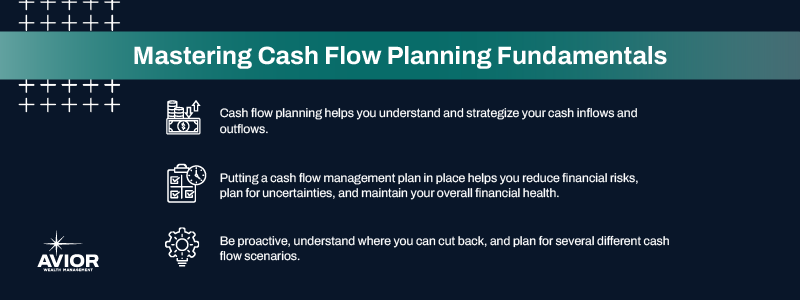Mastering Cash Flow Planning Fundamentals
Learn how to understand and optimize your cash inflows and outflows for more effective financial management.

Successful financial planning starts with your ability to manage cash flow, whether your goal is to secure your family’s wealth, live comfortably in retirement, or grow your business to the next level.
Sharp cash flow planning allows you to accurately project, manage, and optimize your inflows and outflows, often spelling the difference between financial stability and financial uncertainty.
That’s why, in this article, we’ll discuss mastering the fundamentals of cash flow planning as part of your holistic financial management strategy.
What Is Cash Flow Planning?
Cash flow planning simply refers to the management of money as it flows in and out of a personal portfolio, a business, or another savings vehicle.
It encompasses all cash inflows, such as sales revenue and investment income, as well as cash outflows, including operating expenses, loan repayments, and capital expenditures.
The primary goal of cash flow planning is to ensure that your cash inflows exceed your cash outflows, providing the necessary liquidity to meet your obligations, invest in growth opportunities, and maintain financial health.
A cash flow statement is the first place to start with cash flow planning. It’s a document that keeps track of said inflows and outflows, providing you with important trends and insights that you can use to make accurate predictions, projections, and forecasts.
Why Cash Flow Planning Matters
It’s a common mistake to believe that cash flow problems will simply work themselves out so long as you’re making enough money each month.
The issue, however, is that it’s too easy to lose track of small mistakes and harmful spending patterns that add up over time.
Creating a comprehensive cash flow plan will help you avoid this and other unnecessary financial surprises.
Effective cash flow planning is essential for several reasons:
- Ensuring liquidity: Maintaining sufficient cash reserves is critical to meet your short-term obligations, whether that’s payroll, supplier payments, or debt servicing. A well-crafted cash flow plan helps you avoid liquidity crises that could disrupt operations or damage your credit.
- Minimizing financial risk: Cash flow volatility can unfortunately expose you to significant financial risk. Planning for potential shortfalls or surpluses keeps you proactive in risk management. This may mean establishing contingency reserves, managing the timing of big expenses, or negotiating your financing options.
- Enhancing visibility: A detailed cash flow plan provides a clear picture of financial performance so you can make more informed decisions, monitor progress, and adjust strategies as needed. This visibility is crucial for financial sustainability.
Never underestimate just how important it is to have a clear cash flow strategy. Next, we’ll dive into the key components of a sharp cash flow plan.
Key Components of Cash Flow Planning
To master cash flow planning, understand its key components and how they interact with each other.
Consider these areas when working with your financial advisor on your plan.
Cash Flow Forecasting
Accurate cash flow forecasting is another part of your foundation. This involves projecting future cash inflows and outflows over a specified period, typically monthly or quarterly. Forecasts should account for historical data, market trends, and anticipated expenses.
Revenue projections help you estimate future sales or income. Expense projections are where you identify all potential outflows, including fixed costs, like rent and salaries; variable costs, such as utilities; and one-time expenses, like equipment purchases.
You may also consider conducting a sensitivity analysis, which illustrates how different scenarios, such as reduced income or greater costs, will impact your cash flow. Then, you can develop a contingency plan from there so as to avoid making financially damaging emergency decisions
Cash Flow Management
Forecasting involves using the past to predict the future, while cash flow management is the act of continually managing your inflows and outflows.
A couple key components of cash flow management are:
- Accounts receivable: Maintain positive cash flow with timely collection. To improve receivables, try offering discounts for early payments or actively following up on overdue payments.
- Accounts payable: While it is important to meet obligations on time, delaying payments within agreed terms can improve cash flow. Negotiate favorable payment terms with suppliers and prioritize payments based on cash availability.
Additionally, for businesses that hold inventory, optimizing inventory levels is critical to cash flow management. Excess inventory ties up cash, while insufficient inventory can lead to lost sales.
Regularly reviewing and controlling your expenses is also essential to maintaining healthy cash flow. Identify your nonessential costs, renegotiate contracts, and implement cost-saving measures.
Cash Flow Planning Best Practices
Managing cash may look different for everyone, but there are some cash flow best practices that you can use to succeed no matter your situation.
1. Be Proactive
Try to anticipate cash flow challenges and opportunities rather than simply reacting to them. Proactive planning allows for better decision-making, risk management, and financial optimization. Keep your mind on the future.
2. Use Tech Tools
Technologies like financial management software and cash flow forecasting tools help you analyze and monitor cash flow.
In the process, you enhance your planning accuracy, efficiency, and visibility.
3. Commit to Continuous Learning
Keep abreast of market trends, economic indicators, and industry developments that could impact your cash flow. This knowledge permits more accurate forecasting and timely adjustments to your plan.
4. Plan for Multiple Scenarios
We can only predict the future so much before we start becoming paranoid. Develop contigency plans for several best-case and worst-case cash flow scenarios to avoid that paranoia.
Your future self will thank you, should any of those contigency plans be forced into action.
5. Focus on and Identify Cash Flow Drivers
Identify and prioritize the key drivers of cash flow in your business or personal finances. What sources bring in the most income? What expenses are taking up the most resources?
By identifying and focusing on these important drivers, you can more effectively optimize your cash flow.
Master Your Cash Flow Planning With Avior
Cash flow planning is an ongoing process that requires regular attention and improvement. With the right approach, you can navigate the complexities of cash flow management and position yourself for long-term financial success.
Our team at Avior stands ready to help you develop a comprehensive and effective cash flow planning strategy that secures your short-term and long-term financial health. Helping you plan with intention is what we do, but helping you live with a purpose is who we are.
Contact us today to get started with a one-on-one consultation.
Disclaimer: Nothing contained herein should be construed as legal or tax advice. Avior and our Advisors will work with your attorney and/or tax professional to assist with your legal and tax strategies. Please consult your attorney or tax professional with specific legal and/or tax questions. Investment Management and Financial Planner are offered through Avior Wealth Management, LLC, an SEC-registered investment advisor. Past performance is not a guarantee of future results. Investments are subject to loss, including the loss of principal.
No Comments
Sorry, the comment form is closed at this time.




